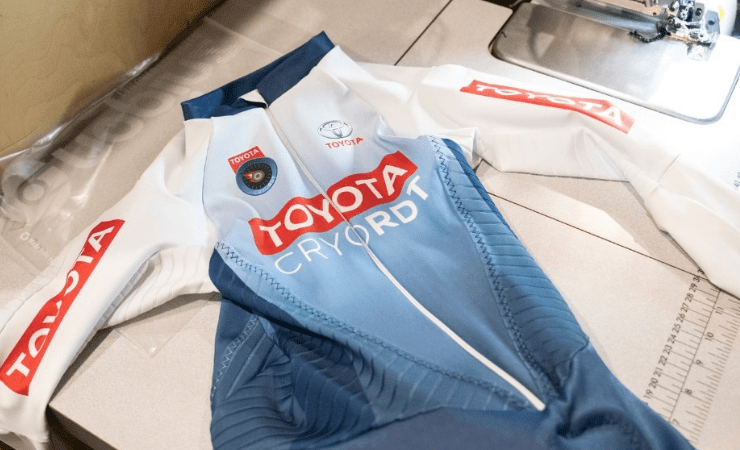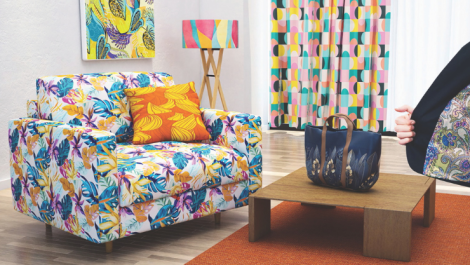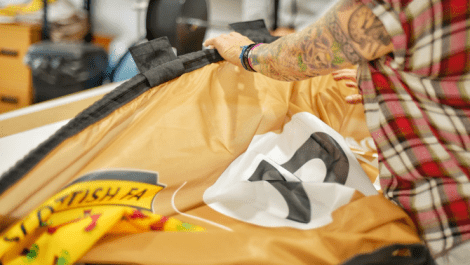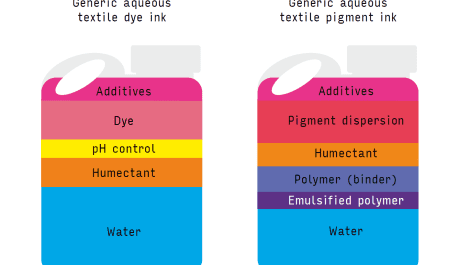Mimaki dye sublimation printers supplied via Hybrid Services and Xpres, together with EarlyVision garment design and visualisation software are allowing a UK-based racing attire manufacturer to chase down success, at home and abroad.
Founded in 2013, Nopinz is a UK-based manufacturer of clothing for cyclists and triathletes. The company’s first product was SpeedPocket, designed to allow competitors to attach their race numbers more easily – and with no pins, hence the name – while improving their all-important aerodynamics. Soon recognising customer demand for premade attire with incorporated number pockets, the company embarked on a mission to manufacture these new product lines itself. Today, 60% of Nopinz’s products are made in-house, catering to a growing customer base across the UK and international markets.
Nopinz makes speed suits for some of the world’s top cycling teams, as well as for competitive amateurs. As company founder Blake Pond explains, ‘A World Tour team is like a Premier League football team, winning and losing by very fine margins. A lot of the kit we make for them is custom fitted, completely bespoke, not just in terms of the print but the whole fit of the item. We even look at minute details such as the material placement to further improve the aerodynamics. We then use 3D scanning to get the measurements of the athlete exactly right. For this, the athlete stands in a booth and is scanned, with those precise measurements being used in the creation of the kit.’
Colour accuracy
To manufacture such garments to the quality and precision required by its clientele, Nopinz sought a printing option with the ability to most accurately replicate colours, including fluorescents. This led it to Xpres, an authorised Mimaki partner, and the printer manufacturer’s TS300P-1800 high-speed dye sublimation textile printer. Available in four- or six-colour configurations, this is a sublimation transfer printer that optimises the printing speed and quality to produce the desired print results. To this end, it provides a wide range of printing modes, from the draft printing mode (which operates at the maximum speed of 115sqm/h) to high-quality printing mode (at 14sqm/h).
Nopinz installed two of these printers in 2016 and they have worked so well for the company that when it sought to upgrade its capabilities in 2022, it stayed with the vendor, installing a Mimaki TS55-1800. This sublimation transfer inkjet printer incorporates various print modes suitable for a variety of work, ranging from high-speed print with a maximum rate of 135sqm/h to practical quality print with an output speed of 50sqm/h, as well as a quality-oriented enhanced picture quality print speed of 31sqm/h. The practical quality mode is said to deliver approximately 130% higher productivity when compared to the Mimaki TS300P-1800.
As two flagship dye sublimation printers from Mimaki, both the TS300P-1800 and TS55-1800 are equipped to print on the various technical fabrics that are needed for cycling attire and can reproduce colours to meet customer expectations.
Mr Pond comments, ‘We tested out a few printers, before we ultimately settled on Mimaki. During our search we prioritised the ability to produce fluorescence and accurately replicate colours. Customers often come to us with existing kit made by other manufacturers, which they want to match, so accurately replicating colour is extremely important. And even without existing kit, customers occasionally ask for specific Pantone colours. When it comes to cycling kit, colour is often pivotal when considering where to buy from.’
Nopinz also places a strong emphasis on sustainability and is committed to minimising its environmental impact. Using a micro-factory approach gives the company better oversight and control of the manufacturing process, including sourcing materials sustainably and locally where possible, reducing transportation, and improving access to recycling.
‘Our ‘zero to landfill’ policy, means that we reduce our wastage where possible and either recycle or donate excess product to charity. We hope to become a B Corp company in the future,’ adds Mr Pond.
Preparing for success
With a steadily growing customer base across the UK and abroad, Nopinz began to look for ways to fine-tune its processes. As Mr Pond notes, ‘Preparing orders for print was done manually and the time needed to do so had become a significant bottleneck in our production process. As we looked to scale up, we knew something needed to change.’
Following a recommendation to look into EarlyVision and its software for the apparel industry, Nopinz has now upgraded that part of its production process too. EarlyVision’s offering claims to ‘enable efficient workflows for mass customisation and on-demand manufacturing’. Its systems streamline the design-to-production workflow, allowing designers to focus on design and create nesting-ready files that are prepared for production automatically based on e-commerce orders. At Nopinz, EarlyVision was integrated with Mimaki’s Rip software. ‘We immediately saw significant improvements, in both time and cost,’ explains Mr Pond. ‘It used to take us 36 hours to print 150 items; we can now do the same in 90 minutes.’
Beyond the printing process, Nopinz has seen other benefits to taking on EarlyVision’s technology. ‘While we endeavour to produce mostly in-house, when we do need to outsource it’s much easier to send these print runs to other locations to be made. As we look to scale up our own production, this will also be a huge help.’
As Nopinz eyes expansion into new territories, Mr Pond expects that Mimaki’s dye sublimation technology will remain the company’s printers of choice. ‘We’re looking to further expand in the US and Australia and because we want to manufacture local to the market, that means setting up micro-factories in those new locations,’ he says.
‘Considering its importance to our customers, we really want to keep colours consistent no matter where they order from, so we wouldn’t consider moving away from Mimaki as our preferred supplier.’





